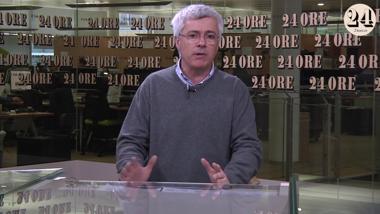The accounts for 2016 of Ubi Banca is in line and in some cases, as well as the objectives of the plan. The same group reorganisation is beyond the expectations. In particular, the data of last year showed, according to the institute, operating revenues “perfectly in line with expectations”, and cost “the lowest of the estimates of the plan.” And the net result, net of the effects related to the Atlas and to the resolution Fund, is the best one of the directions of the plan.
Ubi has ended 2016 with a loss of 830,2 million euro of the profit of 116.8 million euro recorded in 2015. A result that includes the impact of expected expenses for the implementation of the industrial plan accounted for “up front”, starting from June 2016 (about 850 million net), extraordinary contributions to the resolution Fund (50.4 million net) and the impairment of the fund, the Atlas (52.9 million net).
The net of the impacts of the industrial plan and of the extraordinary items, the 2016 would have closed with a normalised profit of 111.6 million (189 in 2015). Accordingly, in line with the business plan, Ubi will propose to shareholders the distribution of a dividend of 0,11 euro per share, equal to that of the previous year.
The writedown of the investment in the fund Atlas was equal to approximately 45% of the amount actually paid. The bank, whose commitment to the Atlas is in the amount of 200 million euros, has in practice reduced the value of its investment of 73 million gross (52,9 net). To date, the amount paid by Ubi in the fund is, therefore, approximately 162 million.
The results of Ubi Banca of 2016 “they are perfectly in line with the objectives of the plan”, commented the chief executive officer, Victor Massiah, illustrating analysts during a conference call with the financial statements for the previous year. “We have registered a sharp decline in gross inflows from exposures performing a Npe (non-performing’exposition, ed.), who are back to the levels of 2007, with a decline of 70% compared to the peak recorded in 2012. Flows lower, clearly, it helps a lot in reducing the stock of Npe”.
While the portfolio of Italian government securities has been reduced by more than 5 billion euros (-28%) last year, down to 13.2 billion, down from 18.3 billion in end-2015 or 1.8 billion in the fourth quarter alone). In detail, the weight of government bonds on the total of the financial assets is decreased to 73.8% of the 90,6% (other financial assets increased to 4.7 billion euros from 1.9 billion for a total dropped to 17.9 billion to 20.2 billion). The industrial plan of the institute provides for a further reduction in the weight of Italian government securities total financial assets at 50% in 2020.
“A 2016 line, and various aspects of the best indications of the plan allows us to confirm our target to 2020″, added the banker. Already this year, the management has provided a strong improvement compared to the previous year of adjusted net income, also favoured by the early completion of the project the Bank Only. Also, the dynamics of the operating income is up compared to that of 2016.
Also, according to the bank, the successful conclusion of the recent agreement with the trade unions and the favorable outcome of the adhesions at the bottom of the income support (more than 1,250 membership applications are received) will allow the institute to improve the goal of the containment of operating costs the applicants. The risk is particularly contained in the portfolio of performing loans, the manoeuvre of increasing the coverage achieved in the first half of 2016 and the continuation of the reduction of the flow of new impaired loans and, consequently, of the stock, should confirm the important reduction in the cost of the credit provided for in the industrial plan for 2017.
While as regards the acquisition of the three good bank (New Bank of the Marche region, the New Bank of Etruria and Latium, and the New Cassa di Risparmio di Chieti), the conditions of pre-closing activities “are taking place according to the procedures,” said the ad. There are a number of preconditions for finalization of the definitive agreement. These relate, primarily, to the sale of npls identified as transferable: “we know that Atlas has already taken a resolution in this sense, it is put to the ground this component,” said Massiah.
we then Need to finalize some of the details set forth in the agreement, including the recapitalisation of banks by the resolution Fund. “The estimate that we have, and we have communicated to the market, is approximately three months. So I am quite optimistic on the fact that we get to the spring with a work already far advanced,” he expected the top managers.
Then, if everything is going in the right direction and if they arrive in the permissions in the expected time, Ubi Banca will launch the capital increase of 400 million euros, established for the acquisition of the three good bank, “by the end of the first half,” said Massiah. On the basis of this timing, it is estimated that the capital increase can be approved by the shareholders ‘ meeting that will convene to give the go-ahead to fiscal 2016, the 7th of April.
As for the impact of the widening of the spread Btp/Bund on the Cet1 capital of Ubi “is not so significant, also because we have reduced our exposure to Italian government securities”. Then, the enlargement from the beginning of the year should have an effect in the order of a few basis points of Cet1 capital “or low double-digit or high single digit,” concluded the ad.
Assurances that not help to boost the title Ubi in the bag, at the moment, down 5.22% to 2,976 euros, thanks to the tone of resigned market (-0,63% the Ftse Mib index and of the other Italian banks. To analysts of Citigroup, the net loss of Ubi in the fourth quarter (-75,6 million against a profit of 32.5 million recorded in the same period of 2015) has been higher to the expectations of the consent due to the extraordinary items, core revenue was in line with expectations, costs better than forecast, and provisions that are substantially in line.
“The market has, however, need to understand the quality of the assets and developments in the capital, even if the trend core is solid. In our opinion, the asset quality is improving and the overall trend of the core revenue went better than expected thanks to cost and to income from commissions. The outlook is positive,” concluded the bank’s business.



 The president of Inps, Tito Boeri (imagoec)
The president of Inps, Tito Boeri (imagoec) 


 © ANSA
© ANSA  (agf)
(agf)  Padoan and Orlandi shake hands at the presentation of the results of the Revenue (ap)
Padoan and Orlandi shake hands at the presentation of the results of the Revenue (ap)  The minister of Economy, Pier Carlo Padoan (imagoec)
The minister of Economy, Pier Carlo Padoan (imagoec)